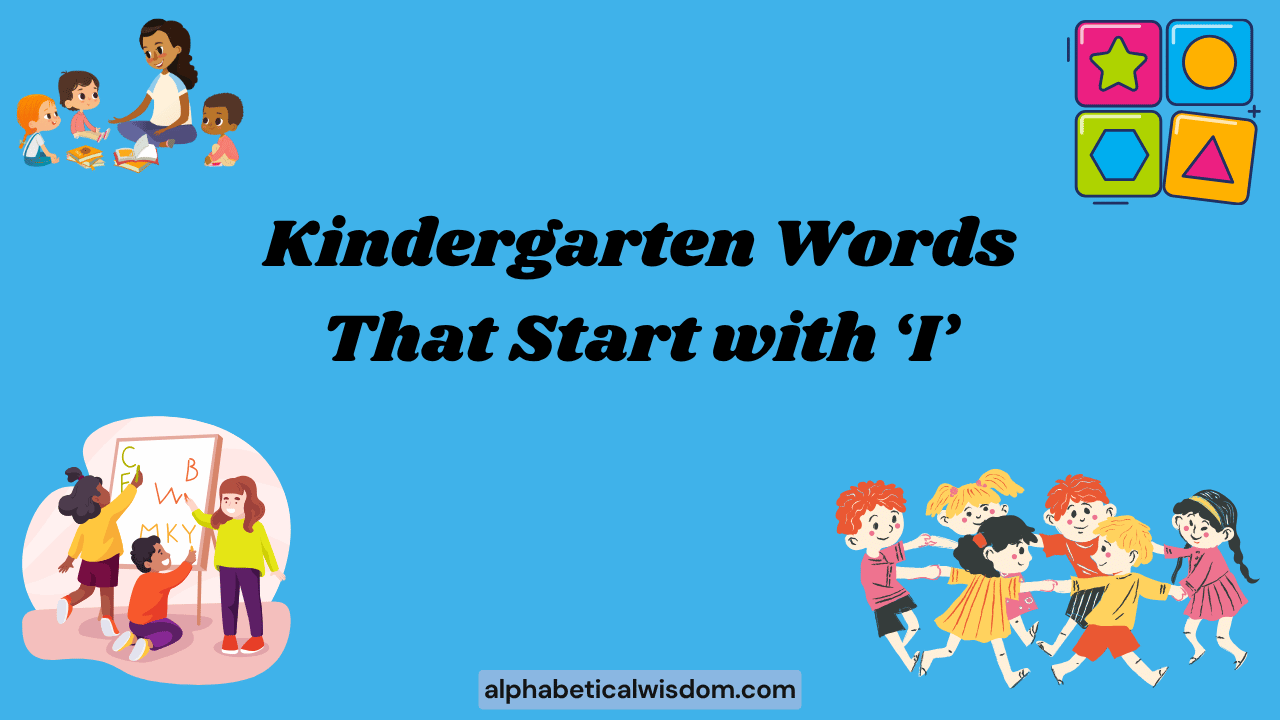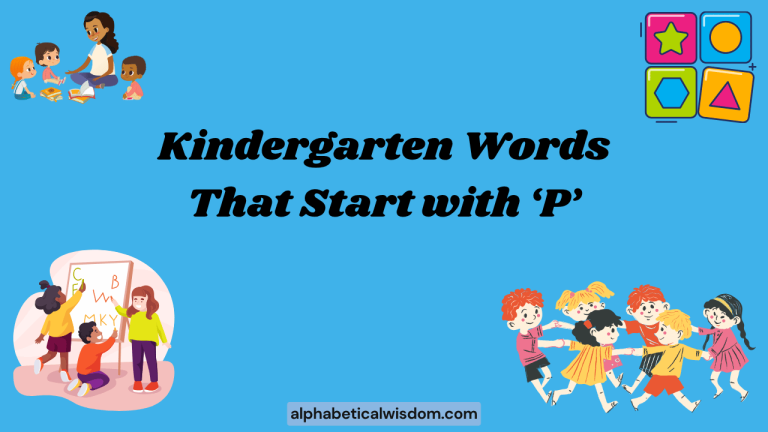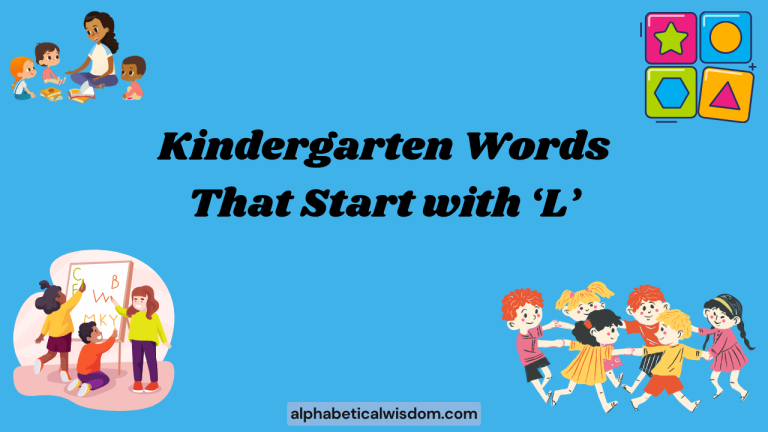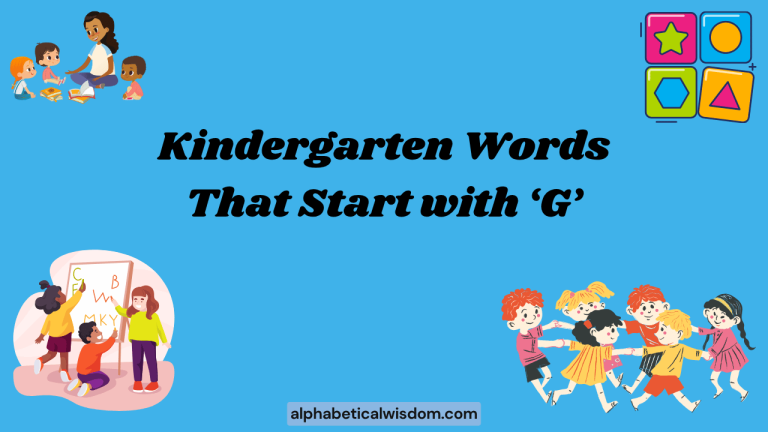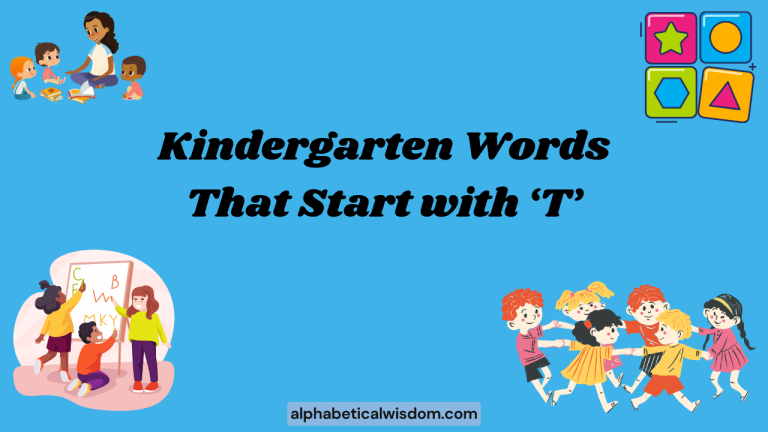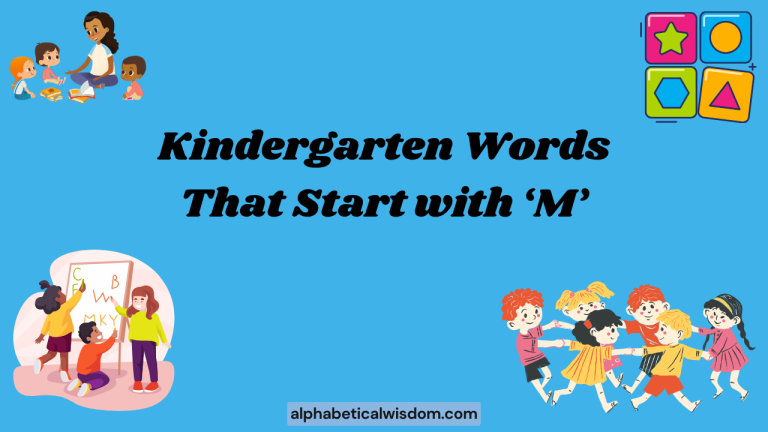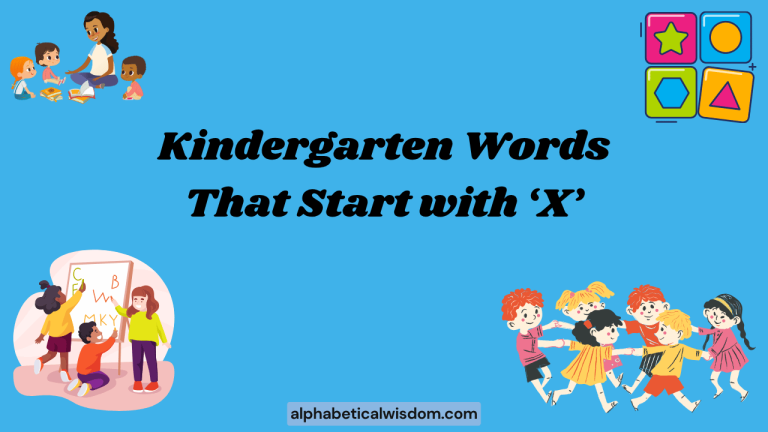Kindergarten Words That Start With I: A Comprehensive Guide
Understanding words that start with the letter ‘I’ is a foundational step in a child’s literacy journey. These words not only expand vocabulary but also enhance phonemic awareness, reading comprehension, and early writing skills.
This guide is designed for parents, educators, and young learners who want to explore and master the basics of ‘I’ words. By engaging with this resource, children will build confidence in their language abilities and develop a lifelong love for reading and writing.
Table of Contents
- Introduction
- Definition of Kindergarten Words That Start With ‘I’
- Structural Breakdown of ‘I’ Words
- Types and Categories of ‘I’ Words
- Examples of Kindergarten ‘I’ Words
- Usage Rules for ‘I’ Words
- Common Mistakes with ‘I’ Words
- Practice Exercises
- Advanced Topics
- FAQ: Frequently Asked Questions
- Conclusion
Definition of Kindergarten Words That Start With ‘I’
Kindergarten words that start with the letter ‘I’ are basic vocabulary terms suitable for children aged 4-6 years. These words are typically simple in structure, easy to pronounce, and frequently used in everyday conversation. They serve as building blocks for more complex language skills. Understanding these words helps children develop phonological awareness, reading fluency, and early writing abilities. These words can function as nouns (e.g., ice), verbs (e.g., is), or adjectives (e.g., icy), depending on their usage in a sentence. The key is to introduce these words in a fun, engaging, and context-rich manner.
The function of these words extends beyond mere vocabulary acquisition. They also play a crucial role in cognitive development.
By learning to recognize and use these words, children improve their memory, attention span, and problem-solving skills. Furthermore, these words are often introduced alongside visual aids, such as pictures and illustrations, which enhances visual learning and reinforces word recognition.
This multi-sensory approach to learning ensures that children retain the information more effectively and can apply it in various contexts.
The contexts in which these words are used are diverse and varied. They can be found in storybooks, educational games, classroom activities, and everyday conversations.
For example, a child might encounter the word “ice” while reading a story about winter or while playing with ice cubes during a science experiment. Similarly, the word “is” is frequently used in simple sentences to describe objects or people, such as “The cat is black.” By exposing children to these words in different contexts, educators and parents can help them develop a deeper understanding of their meaning and usage.
Structural Breakdown of ‘I’ Words
The structural breakdown of ‘I’ words for kindergarten involves understanding their basic phonetic components and how they are formed. Most ‘I’ words start with the short ‘i’ sound (as in igloo) or the long ‘i’ sound (as in ice). The initial ‘I’ sound is followed by other letters that create different words with varying lengths and complexities. For example, a simple word like “in” consists of just two letters, while a slightly more complex word like “itch” has four letters. Understanding these structural elements helps children decode new words and improve their spelling skills.
The phonetic structure of ‘I’ words is also crucial. The short ‘i’ sound is typically represented by the letter ‘i’ alone, while the long ‘i’ sound is often paired with a silent ‘e’ at the end of the word, as in “ice” or “like.” These phonetic patterns are essential for children to recognize as they learn to read and write.
Additionally, some ‘I’ words may contain consonant blends or digraphs, such as “ink” or “itch,” which require children to blend the sounds of multiple letters together. These skills are fundamental for developing strong reading abilities.
Furthermore, the morphological structure of ‘I’ words can also be explored. While kindergarten-level words are typically simple, introducing the concept of prefixes and suffixes can be beneficial.
For example, the word “ill” can be used as a base word, and children can learn about the prefix “un-” to create the word “unwell.” Similarly, the word “icy” can be broken down into the base word “ice” and the suffix “-y.” By understanding these morphological elements, children can expand their vocabulary and improve their understanding of word formation.
Types and Categories of ‘I’ Words
‘I’ words, like all words, can be categorized into different parts of speech. For kindergarteners, it’s important to focus on the most common categories: nouns, verbs, and adjectives.
Understanding these categories helps children use ‘I’ words correctly in sentences and comprehend their meaning in different contexts.
Nouns
Nouns are words that represent people, places, things, or ideas. ‘I’ nouns commonly introduced in kindergarten include ice, igloo, ink, and island. These words are concrete nouns, meaning they represent tangible objects that children can see, touch, or experience. Learning these nouns helps children build their vocabulary and understand the world around them.
Verbs
Verbs are words that describe actions or states of being. ‘I’ verbs are less common in kindergarten vocabulary, but important examples include is, itch, and imagine. The verb “is” is a form of the verb “to be” and is essential for forming simple sentences. “Itch” describes a physical sensation, and “imagine” describes a mental process. Introducing these verbs helps children understand how to describe actions and states in their sentences.
Adjectives
Adjectives are words that describe nouns. ‘I’ adjectives commonly used in kindergarten include icy, ill, and important. These adjectives help children add detail and description to their sentences. For example, “icy” describes something covered in ice, “ill” describes someone who is sick, and “important” describes something of great value or significance. By learning these adjectives, children can make their writing more vivid and descriptive.
Examples of Kindergarten ‘I’ Words
Providing numerous examples of ‘I’ words in different contexts is crucial for reinforcing understanding. The following tables list various ‘I’ words categorized by their part of speech, along with example sentences to illustrate their usage.
Nouns Examples
Here are some examples of nouns that start with the letter “I”, along with their definitions and example sentences. This table will help you understand how these nouns are used in context.
| Word | Definition | Example Sentence |
|---|---|---|
| Ice | Frozen water | The ice is cold and slippery. |
| Igloo | A dome-shaped house made of blocks of ice | The Inuit people live in an igloo. |
| Ink | A colored fluid used for writing or printing | I used blue ink to write the letter. |
| Island | A piece of land surrounded by water | We went on vacation to a tropical island. |
| Idea | A thought or suggestion | I have a great idea for a game! |
| Insect | A small animal with six legs | A ladybug is a type of insect. |
| Image | A visual representation of something | The image on the screen was very clear. |
| Impression | An effect or feeling retained from an experience | The movie left a strong impression on me. |
| Item | A particular thing or object | Please put each item in the shopping cart. |
| Interest | The feeling of wanting to know or learn about something | She showed great interest in the science project. |
| Invitation | A written or verbal request inviting someone to go somewhere or to do something | I received an invitation to the party. |
| Inside | The inner part of something | Let’s go inside because it’s cold outside. |
| Instance | An example or single occurrence of something | This is just one instance of his kindness. |
| Intent | An aim or purpose | His intent was to help others. |
| Issue | An important topic or problem for debate or discussion | We need to discuss the environmental issue. |
| Identity | The characteristics determining who or what a person or thing is | She established her own identity as an artist. |
| Illusion | A false idea or impression | The magician created an amazing illusion. |
| Industry | Economic activity concerned with the processing of raw materials and manufacture of goods in factories | The car industry is very important to our economy. |
| Influence | The capacity to have an effect on the character, development, or behavior of someone or something | Her parents had a big influence on her career choices. |
| Information | Facts provided or learned about something or someone | We need more information before we can decide. |
| Ingredient | Any of the foods or substances that are combined to make a particular dish | The main ingredient in this cake is chocolate. |
| Injury | Physical harm or damage to someone’s body | He suffered a minor injury during the game. |
| Instrument | A tool or device used for a particular task, especially for delicate or scientific work | A thermometer is a useful instrument for measuring temperature. |
| Investment | The action or process of investing money for profit or material result | He made a smart investment in the stock market. |
| Investor | A person or organization that puts money into financial schemes, property, etc. with the expectation of achieving a profit | The company is looking for a new investor. |
Verbs Examples
Here are some examples of verbs that start with the letter “I”, along with their definitions and example sentences. Understanding these verbs will help you express actions and states of being effectively.
| Word | Definition | Example Sentence |
|---|---|---|
| Is | A form of the verb “to be” | The sky is blue. |
| Itch | To have an irritating sensation that makes you want to scratch | My skin itches after being in the sun. |
| Imagine | To form a mental image or concept of something | Imagine you are flying in the sky. |
| Import | To bring goods or services into a country from abroad for sale | Our company imports coffee from Brazil. |
| Improve | To make or become better | I want to improve my grades this semester. |
| Include | To comprise or contain as part of a whole | The price includes breakfast and dinner. |
| Increase | To become or make larger or more numerous | The population of the city continues to increase. |
| Indicate | To point out or show | The sign indicates the way to the beach. |
| Inform | To give someone facts or information | Please inform me if you have any questions. |
| Inspire | To fill (someone) with the urge or ability to do or feel something, especially creatively | The artist’s work inspires me. |
| Install | To place or fix (equipment or machinery) in position ready for use | We need to install a new air conditioner. |
| Instruct | To direct or command someone to do something | The teacher instructed the students to read the chapter. |
| Insult | To speak to or treat with disrespect or scornful abuse | Don’t insult others with your words. |
| Intend | To have as one’s purpose or plan | I intend to finish this project by tomorrow. |
| Interpret | To explain the meaning of (information, words, or actions) | The translator will interpret the speech. |
| Interrupt | To stop the continuous progress of (an activity or process) | Please don’t interrupt me when I’m speaking. |
| Introduce | To present (someone) to another person; to make (someone) known to someone else formally | Let me introduce you to my friend. |
| Invest | To put (money) into financial schemes, shares, or property with the expectation of achieving a profit | I want to invest in the stock market. |
| Investigate | To carry out a systematic or formal inquiry to discover and examine the facts of an incident, allegation, etc. so as to establish the truth | The police will investigate the crime. |
| Invite | To ask (someone) formally to do something or to go somewhere | I want to invite you to my party. |
| Issue | To supply or distribute something | The government will issue new guidelines. |
| Identify | To establish or indicate who or what (someone or something) is | Can you identify the bird in the picture? |
| Illustrate | To provide (a book, newspaper, etc.) with pictures or other artwork | The artist will illustrate the children’s book. |
| Imply | To indicate the truth or existence of (something) by suggestion rather than explicit statement | His words imply that he is not happy. |
| Implement | To put (a decision, plan, agreement, etc.) into effect | The company will implement the new policy next month. |
Adjectives Examples
Here are some examples of adjectives that start with the letter “I”, along with their definitions and example sentences. These adjectives will help you describe nouns more effectively and add detail to your writing.
| Word | Definition | Example Sentence |
|---|---|---|
| Icy | Covered with ice | The road was very icy this morning. |
| Ill | Not in good health; sick | She stayed home because she was feeling ill. |
| Important | Of great significance or value | It is important to study hard for your exams. |
| Ideal | Representing or conforming to an ideal or perfect standard or value | This is the ideal place for a picnic. |
| Identical | Similar in every detail; exactly alike | The twins are identical. |
| Immediate | Happening or done without delay | We need immediate help. |
| Immense | Extremely large or great, especially in scale or degree | The ocean is immense. |
| Impartial | Treating all rivals or disputants equally; fair and just | A judge must be impartial. |
| Impolite | Not having or showing good manners; rude | It is impolite to talk with your mouth full. |
| Impossible | Not able to occur, exist, or be done | It seems impossible to climb that mountain. |
| Impressive | Evoking admiration through size, quality, or skill; grand or imposing | The fireworks display was very impressive. |
| Independent | Not depending on another for livelihood or subsistence | She is an independent woman. |
| Individual | Single; separate | Each individual student has their own desk. |
| Inferior | Lower in rank, status, or quality | This product is of inferior quality. |
| Infinite | Limitless or endless in space, extent, or size | The universe is infinite. |
| Influential | Having a great influence on someone or something | She is an influential leader. |
| Inherent | Existing in something as a permanent, essential, or characteristic attribute | Risk is inherent in skydiving. |
| Initial | Occurring at the beginning; first | The initial step is to gather all the materials. |
| Innocent | Not guilty of a crime or offense | The jury found him innocent. |
| Innovative | Featuring new methods; advanced and original | The company is known for its innovative products. |
| Inquisitive | Unduly curious about the affairs of others; prying | She is a curious and inquisitive child. |
| Insightful | Having or showing an accurate and deep understanding; perceptive | He gave an insightful presentation. |
| Instant | Happening immediately | We provide instant updates. |
| Intellectual | Relating to the intellect | He is an intellectual person. |
| Intelligent | Having or showing intelligence, especially of a high level | Dolphins are intelligent animals. |
Usage Rules for ‘I’ Words
Using ‘I’ words correctly involves understanding basic grammar rules, particularly capitalization and sentence structure. These rules ensure that children use these words appropriately in their writing and speaking.
Capitalization Rules
The letter ‘I’ has a unique capitalization rule: when used as a pronoun (referring to oneself), it is always capitalized. This rule is crucial for children to learn early on.
For example, “I am going to the park” is correct, while “i am going to the park” is incorrect. This rule applies regardless of where the pronoun appears in the sentence.
When ‘I’ is part of a noun, verb, or adjective, it is typically not capitalized unless it begins a sentence or is part of a proper noun. For example, “ice” is not capitalized unless it’s the first word of a sentence.
However, place names like “Iceland” are always capitalized because they are proper nouns.
Sentence Structure
‘I’ words, like all words, must be used in grammatically correct sentences. This involves ensuring that the subject and verb agree, and that the sentence makes sense.
For example, “I am happy” is a complete and grammatically correct sentence. However, “I happy” is incorrect because it lacks a verb.
When using ‘I’ words, it’s important to consider the context of the sentence. For example, “The ice is cold” uses “ice” as a noun, while “The road is icy” uses “icy” as an adjective.
Understanding the part of speech helps children construct meaningful and grammatically correct sentences. Additionally, children should be encouraged to use a variety of sentence structures to make their writing more engaging.
Common Mistakes with ‘I’ Words
Children often make common mistakes when learning ‘I’ words. Addressing these mistakes directly can help reinforce correct usage.
Here are some frequent errors and how to correct them:
- Incorrect Capitalization: Writing “i” instead of “I” when referring to oneself.
- Incorrect: i am going to school.
- Correct: I am going to school.
- Misspelling Common Words: Confusing “ill” with “eel” or “ice” with “eyes”.
- Incorrect: I feel like an eel. (Intended meaning: I feel ill.)
- Correct: I feel ill.
- Incorrect Verb Usage: Using the wrong form of the verb “to be”.
- Incorrect: I is happy.
- Correct: I am happy.
- Misunderstanding Word Meaning: Using “imagine” when “image” is more appropriate.
- Incorrect: I see an imagine in the book.
- Correct: I see an image in the book.
Practice Exercises
Practice exercises are essential for reinforcing learning. These exercises are designed to help children practice using ‘I’ words in different contexts.
Exercise 1: Fill in the Blanks
Complete the following sentences with the correct ‘I’ word.
| Question | Answer |
|---|---|
| 1. The _______ is a cold place. | Ice |
| 2. An _______ is a small creature with six legs. | Insect |
| 3. She is feeling _______ today. | Ill |
| 4. _______ am going to the store. | I |
| 5. The _______ is surrounded by water. | Island |
| 6. The opposite of out is _______. | In |
| 7. My new shoes don’t _______ my feet. | Fit |
| 8. I like to _______ stories. | Imagine |
| 9. He put _______ in his pen. | Ink |
| 10. This test is very _______. | Important |
Exercise 2: Matching
Match the ‘I’ word with its definition.
| Word | Definition | Answer |
|---|---|---|
| 1. Ice | a. A small creature with six legs | 1. d |
| 2. Ill | b. A dome-shaped house made of ice | 2. e |
| 3. Igloo | c. A colored fluid used for writing | 3. f |
| 4. Insect | d. Frozen water | 4. a |
| 5. Island | e. Not in good health; sick | 5. b |
| 6. Ink | f. A piece of land surrounded by water | 6. c |
Exercise 3: Sentence Building
Create a sentence using the given ‘I’ word.
| Word | Example Sentence |
|---|---|
| 1. Ice | The ice is melting in the sun. |
| 2. Igloo | We built an igloo in the snow. |
| 3. Ink | The pen ran out of ink. |
| 4. Island | We visited a beautiful island last summer. |
| 5. Imagine | Imagine you are a superhero! |
| 6. Is | The cat is sleeping. |
| 7. Ill | He is ill and needs to rest. |
| 8. Important | It is important to be kind. |
| 9. Insect | There is an insect on the flower. |
| 10. Inside | Let’s go inside the house. |
Advanced Topics
For advanced learners, exploring more complex aspects of ‘I’ words can be beneficial. This includes understanding idioms, figurative language, and nuanced meanings.
For example, the idiom “in the blink of an eye” uses the word “eye” (related to ‘I’ through its phonetic sound) to describe something happening very quickly. Similarly, understanding the subtle differences between “imply” and “infer” can enhance comprehension and communication skills.
Additionally, exploring the etymology of ‘I’ words can provide insights into their historical and cultural context.
Another advanced topic is the use of ‘I’ words in different registers and contexts. Formal writing may require a more sophisticated vocabulary than casual conversation.
Understanding these nuances can help learners adapt their language to suit different situations. For example, the word “ill” might be replaced with “unwell” in a formal setting.
Furthermore, exploring the use of ‘I’ words in literature and poetry can enhance appreciation for the beauty and complexity of the English language.
Finally, advanced learners can delve into the study of phonetics and phonology to understand the underlying sounds of ‘I’ words and how they are produced. This can involve analyzing the articulation of the initial ‘I’ sound and its variations in different words.
Additionally, learners can explore the relationship between spelling and pronunciation, and how these can sometimes differ in English. This deeper understanding of the phonetic and phonological aspects of ‘I’ words can further enhance their language skills and appreciation for the intricacies of the English language.
FAQ: Frequently Asked Questions
- Why is it important for kindergarteners to learn ‘I’ words?
Learning ‘I’ words is crucial for building a strong foundation in literacy. These words are often simple, frequently used, and help children develop phonemic awareness, reading fluency, and early writing skills. Mastering these words boosts confidence and encourages a lifelong love for learning.
- How can I make learning ‘I’ words fun for my child?
Make learning fun by using games, flashcards, and interactive activities. Read books with ‘I’ words, create picture cards, and play word-matching games. Incorporate these words into everyday conversations to reinforce their meaning and usage.
- What are some common ‘I’ words that kindergarteners should know?
Common ‘I’ words include ice, igloo, ink, island, is, ill, imagine, and important. These words are frequently used in children’s books and everyday conversations, making them essential for early vocabulary development.
- How can I help my child with the capitalization rule for ‘I’?
Emphasize that the pronoun “I” is always capitalized, regardless of its position in the sentence. Use visual aids, such as posters or charts, to remind children of this rule. Practice writing sentences together, focusing on correct capitalization.
- What should I do if my child is struggling to pronounce ‘I’ words?
Break down the words into smaller, more manageable sounds. Use phonetic charts to illustrate the different sounds of the letter ‘I’. Encourage your child to practice repeating the words slowly and clearly, focusing on correct pronunciation.
- Are there any online resources that can help my child learn ‘I’ words?
Yes, there are many online resources available, including educational websites, interactive games, and printable worksheets. Look for resources that are specifically designed for kindergarteners and focus on vocabulary development and phonemic awareness.
- How can I incorporate ‘I’ words into everyday activities?
Incorporate ‘I’ words into everyday activities by pointing out objects that start with ‘I’, such as “ice” in a drink or “ink” in a pen. Encourage your child to describe things using ‘I’ adjectives, such as “icy” for a cold surface or “important” for a necessary task.
- What are some common mistakes to watch out for when teaching ‘I’ words?
Common mistakes include incorrect capitalization, misspelling common words, and using the wrong form of the verb “to be.” Address these mistakes directly and provide plenty of opportunities for practice and reinforcement.
- How do I explain that the letter ‘I’ can have different sounds?
Explain that ‘I’ can make different sounds, like the short ‘i’ in “igloo” and the long ‘i’ in “ice”. Use visual aids and auditory examples to help children distinguish between these sounds. Practice saying words with both sounds to reinforce their understanding.
- What is the best way to teach my child new vocabulary?
The best way to teach new vocabulary is through context and repetition. Introduce new words in meaningful sentences and provide opportunities for your child to use them in different contexts. Use visual aids, such as pictures and illustrations, to reinforce word recognition and comprehension.
Conclusion
Mastering kindergarten words that start with the letter ‘I’ is a fundamental step in early literacy development. By understanding the definition, structural breakdown, and usage rules of these words, children can build a strong foundation for future learning.
Through engaging examples, practice exercises, and addressing common mistakes, educators and parents can effectively guide young learners on their language journey. Regular practice and a supportive learning environment are key to success.
Remember to make learning
more interactive and fun by incorporating games, stories, and real-life examples. Celebrate your child’s progress and encourage them to continue exploring the wonderful world of words.
With dedication and the right resources, young learners can confidently master ‘I’ words and develop a lifelong love for reading and writing. By fostering a positive attitude towards learning, you can inspire children to embrace challenges and achieve their full potential in language development.
